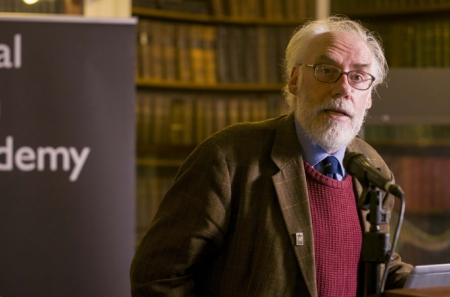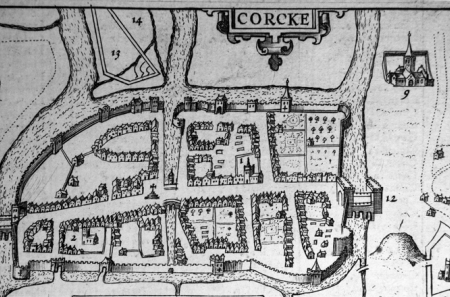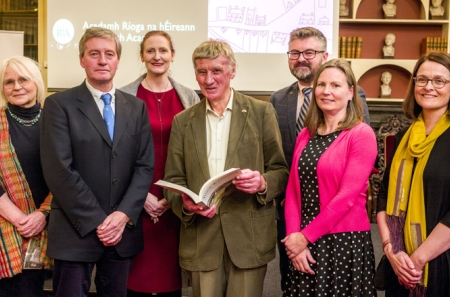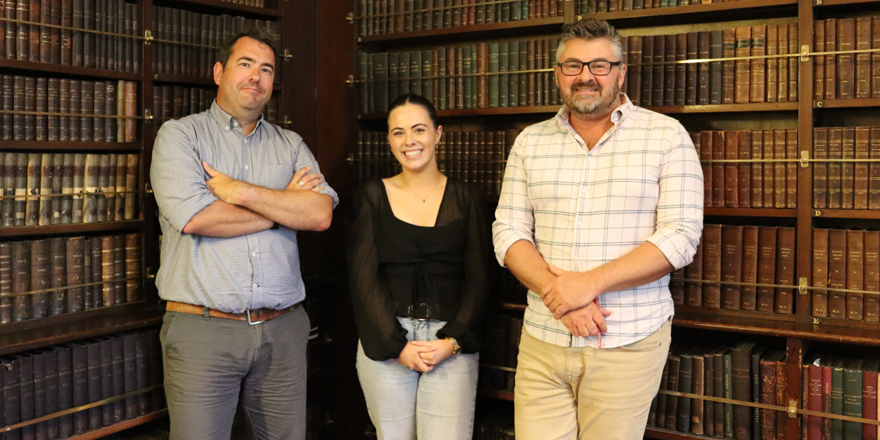
SPUR student, Aoife Murphy in the IHTA
11 September 2023Maynooth University history student, Aoife Murphy, gives an account of her six weeks as a SPUR student in the Irish Historic Towns Atlas programme.
My name is Aoife Murphy and I am a second-year student at Maynooth University studying Law and History. I have just completed my six-week research experience with the Irish Historic Towns Atlas (IHTA) in the Royal Irish Academy (RIA) that took place from 19 June to 28 July 2023. This opportunity was made possible through the Summer Programme for Undergraduate Research (SPUR) scheme conducted by Maynooth University. SPUR is an active, research based, paid experiential learning programme for successful undergraduate students who want to learn more about the postgraduate experience and possibly pursue a career in research. It is supported by the university in partnership with many different organisations. My objectives for applying to this programme were to gain an insight into the processes of a major history project, improve my research and recording skills, along with being able to actively contribute to a live and ongoing publication.
At the beginning, I was introduced to how the IHTA works by the RIA staff, who would be my fellow colleagues for the coming weeks: Sarah Gearty, Jennifer Moore, Amanda (Mani) Morse, Frank Cullen and my Maynooth University mentor Jonathan Wright. The focus of the work I was to be involved in was compiling data for Cork city but I was also to carry out archival research on Dublin suburbs and Ballyshannon for the IHTA. Over the coming weeks I was given the opportunity to attend meetings and meet researchers and academics from various backgrounds who are involved in the IHTA and RIA including: Angela Byrne, Rachel Murphy, Raymond Gillespie, Howard Clarke, Máire Ni Laoí, Michael Potterton and Ruth McManus.
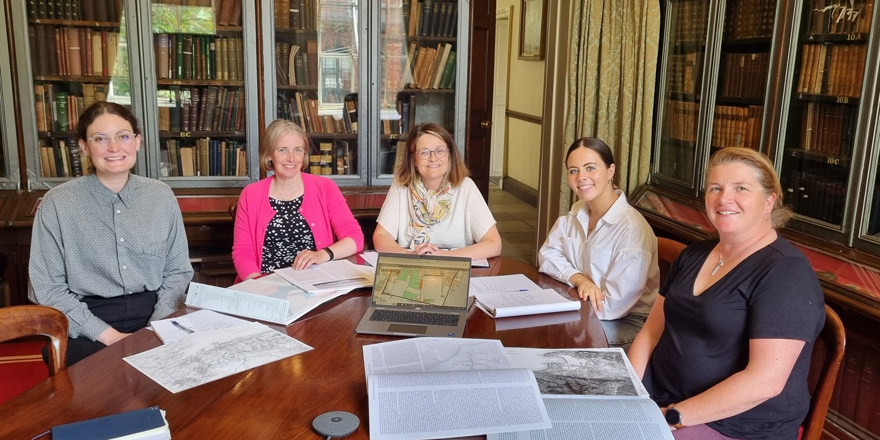
[Mani Morse, Rachel Murphy, Sarah Gearty, Aoife Murphy, Jennifer Moore]
The first area I began my research in was on the Dublin suburbs series for the IHTA. This involved research, for example, investigating the buildings of Dublin and the topographical developments relating to these buildings in the areas of Kilmainham/Inchicore and Drumcondra. Most of this work took place in the RIA Library where I got to experience the researching and recording of original documents such as the Dublin/Irish Builder. This was something I had not done before. I carefully noted relevant information and photographed documents I believed to be of use. From there I would then submit the information and photographs into an Excel spreadsheet for future authors of the series to relate back to. My work also took me to the National Library of Ireland (NLI) where I received my reader’s ticket and was introduced to the online databases and the manuscript room. My work in NLI involved extrapolating information from manuscripts and documents on the Greene Family Papers. Through the help and guidance of Sarah, I recorded any relevant information and carefully photographed some of the original documents, which took careful handling as these primary source documents, particularly the maps, were quite fragile.
Working on the Ballyshannon atlas added a new dimension to the research I was carrying out. Using online records I was deciphering information from early deeds. Although I only spent a short time on this area, the most important learning I took from this experience was that the deeds are quite difficult to read and so it was vital to have the confidence to work independently and understand the importance of asking for help if needed.
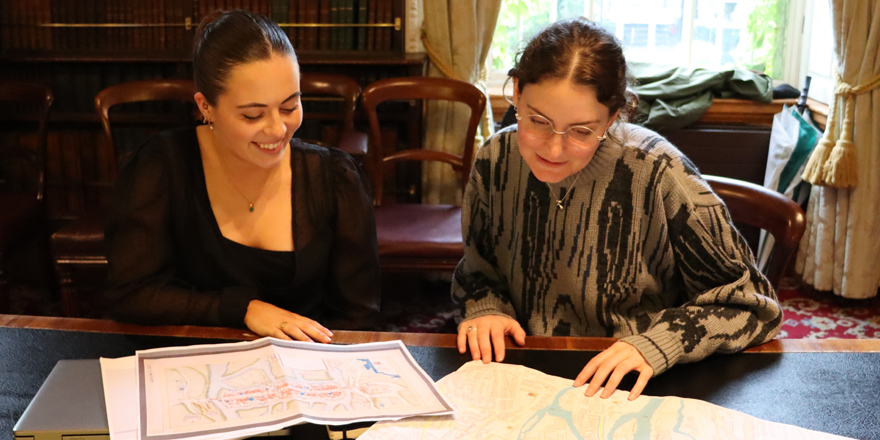
[Aoife Murphy and Mani Morse]
The Cork atlas was one that I spent most of my time here working on. I began by assisting Frank on some editorial tasks on the text. This involved helping with some editorial finishings such as spacing and spelling on the individual entries in the topographical information. My next and probably my most substantial task was assisting the team on the development of the Digital Atlas of Cork. We began by having a team induction day to discuss the layout and agenda for the Digital Atlas and what tasks we would be taking as individuals. I must admit, I did fear that working on projects such as this would involve a high degree of training and that my unfamiliarity with the databases, processes and general methods would hold me back. This was not allowed for one second, given the explanation and often patience awarded to me by Sarah and Jennifer, and especially by the Data Manager for the project, Mani. From the Word documents containing the information from the upcoming Cork atlas, we inputted topographical information into the ArcGIS system so that future researchers can digitally search information on the topographical developments of Cork from its earliest recording to the present day.
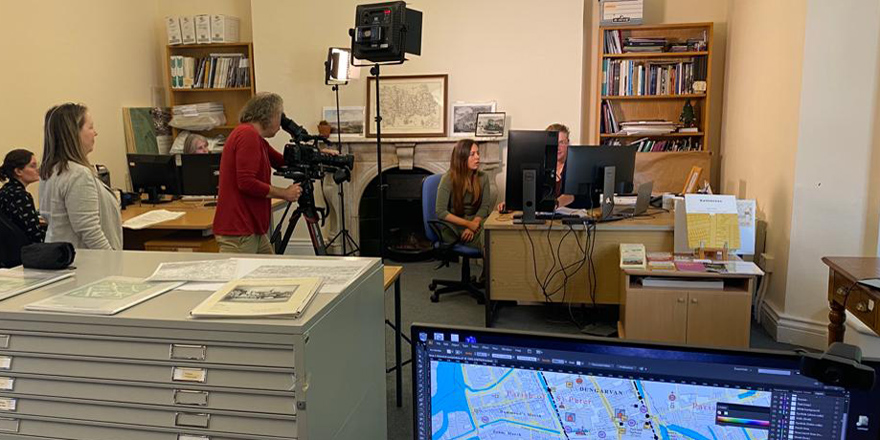
[Filming 'Placing Our Heritage' video on Cork for Heritage Week with Frameworks Films]
Every day was a new and exciting one in the office, especially our five minutes of fame when filming our video on Cork for Heritage Week 2023! This also included a great day trip down to Cork city where we visited Elizabeth Fort, walked the streets of some of our inputted entries and enjoyed a special guest appearance from the Lord Mayor of Cork, Kieran McCarthy.
Working on the project taught me to be more self-disciplined and to meet deadlines. I learned to set realistic goals both short and long-term. Working as part of a team while having an equally important independent role demanded a high degree of flexibility. As the project is very much alive and collaborative, plans can change weekly or daily and indeed on an hourly basis. I feel that working with the IHTA has provided me with the skills to become more flexible and adaptable. Working as part of a team can be difficult especially if you are a temporary addition but I can honestly say that I felt so welcomed by the team at the IHTA and felt so included and supported throughout my term there. I would recommend to any incoming student interested in the SPUR programme to take the opportunity and hopefully gain a beneficial experience that was close to that of mine at the IHTA in the RIA. I would finally like to thank the team for all their help and support over the six weeks. It was an experience I will not forget and hopefully I will be able to work with them again in the near future.
Aoife Murphy
August 2023

